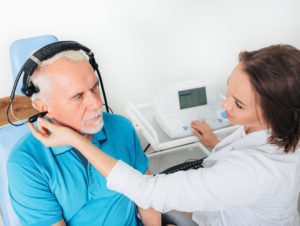
In 2017, a report was released that identified mid-life hearing loss as a significant risk factor for dementia. This report sparked the need for more research about hearing loss as it’s so widespread and could have a significant impact on the overall number of dementia cases. This research could help to not only understand the links between hearing loss and dementia, but also help to understand how other senses could affect risk.
Researchers led the first study that was presented at the Alzheimer’s conference from the University of Washington. They looked at 2,051 aged 75 or older to find a link between hearing loss, vision loss, and dementia risk. Participants were required to self-report problems with vision and hearing. There was a follow-up over a period of seven years to check if any cases of dementia had developed. Researchers found that having both sight and hearing problems increased dementia risk by 86 percent compared to those with no sensory issues who showed an 11 percent risk.
The second study presented at the Alzheimer’s conference looked at the association between dementia risk and the loss of four senses, including smell, touch, vision, and hearing. These researchers from San Francisco studied a group of 1,810 participants aged 70–79. They assessed sensory loss in participants and used this information to calculate a sensory function score for each individual. Participants were then followed up over tens year to record any cases of dementia that had developed.
This research team found that dementia risk was seven times higher in the participants with the lowest sensory function scores. Mild impairment in multiple senses was also linked to increased risk.
No Treatments for the Progression of Dementia
After these studies were presented at the Alzheimer’s conference, Dr. Sara Imarisio, Head of Research at Alzheimer’s Research UK, said, “With no treatments yet able to stop the progression of dementia, it is crucial that we understand the different factors that impact risk and what we might be able to do to change them.”
“This research suggests that loss of multiple senses may increase dementia risk. This could help us to identify people at risk earlier and empower individuals to take targeted steps to reduce their risk of dementia.
“We don’t yet know what underlies the link between sensory impairment and dementia risk. Some researchers believe the link may be driven by a decline in the amount of sensory input a person receives, leaving them with less opportunity for social engagement and mental stimulation.”
“The only way to find out whether treating hearing and vision problems could reduce dementia risk is to test this in trials involving people.”
With cognitive decline on the rise, including dementia, studies like these are the key to help reduce risk with preventative measures. If you or someone you love is experiencing sensory issues, it is imperative to get check by a doctor to help reduce any risks of secondary health problems.